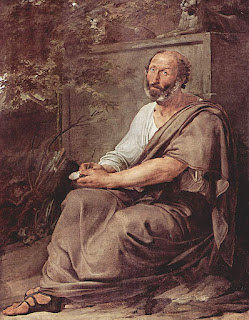Faith, Doubt and Anti-Metanoia series, Part X. For context, start at the introduction.
I used to follow a Christianity that had artificially definite meanings and that tried to force meanings into one complete, coherent system. The previous posts in this blog series explain how I stopped being a Christian and gained new ways of processing meaning. In this post, I’ll speculate on my anticipated next steps in meaning-space.
My goal is to live as best I can. I mean this not in the sense of eating fine food on the deck of a large yacht, but in the sense of choosing the best action at each moment in time. This question has consumed Western thought at least since Aristotle. In the words of the Wikipedia article on Aristotelian ethics:
Aristotle first used the term ethics to name a field of study developed by his predecessors Socrates and Plato. In philosophy, ethics is the attempt to offer a rational response to the question of how humans should best live.
Painting of Aristotle by Francesco Hayez. Public domain.
To live best, I ought to continuously live better, that is, I must continue to grow as a person. After exiting Christianity, I was pretty tired of working on my self and my systems of meaning making, and I stopped for a while. Maybe this was a fatigue-induced shock reflex, or maybe it was a ‘vacation.’ But I can’t remain stopped forever. It’s not so much about quickly reaching a goal as it is about keeping growth going. I hope to live several more decades, so I have plenty of time to grow. I want to cultivate and sustain growth in a reasonable direction.
In many ways, the direction is definite and pre-set: I know some of what “living better" means, and specifically those around me can imagine a "better Peter.” In other ways, “living better" is actually really vague. (The goal itself is nebulous and patterned.) I think that more technical capability is better than less, all other things being equal, but it’s mostly orthogonal to what I would term “meaning-space.” (Similar logic applies to athletic development of the body.) The more relevant thread is learning to make meaning in more capable ways by expanding my identity to be meta-systematic and meta-rational.
Since meaning is co-created with other people, a big part of doing meaning better is interacting with other people in better ways. Usually, interacting better means being more empathetic, humane, considerate and friendly. Growing in these kinds of ways is the path of virtue. People have been trying to chart the path of virtue for at least as long as history itself. I won’t be a source of virtue innovation; I only hope to more thoroughly apply what is already known.
Living the best I can also means helping other people grow. As a father, this means helping my kids grow. As a husband, it’s helping my wife grow. As a member of society at large, I have a responsibility to help everyone grow.
My overall direction in meaning-space is toward living better and personal growth, plus enabling better living and growth for those around me. Looking forward to the next steps is fundamentally speculative. Probably the most interesting directions are not apparent to me yet, but I ought to head toward my best guess at the frontier. Here are some of the questions I’ve been asking myself:
- How can I flow with nebulosity better?
- How can I grow into a meta-systematic, meta-rational approach to life? Which systems should go in my toolbox?
- After removing the supernatural, what is left of “spiritual” development?
- What’s left of the process of leaving Christianity? How do I finish burying Christianity’s toxic bones so that they don’t have the power to poison me?
- How can I get unstuck on making progress in those areas of life where I consistently make choices that I later regret?
- How do I help my wife and children to live better?
- How do I navigate social situations where I need to be respectful of people who disagree with me on matters that encroach on their and/or my identity?
- In what ways does my exit from Christianity mirror broader social changes?
- How do we push society forward to embracing rationality and then meta-rationality?
- How do we build meanings that don’t rely on Eternalism for a large society?
- What glue would hold a global, meta-rational community together?
For me, these are open questions. I don’t know the answers. At the moment, I have only fractured, tentative ideas. Furthermore, I suspect that the best questions still haven’t come along.
While drafting, I made several unsuccessful attempts at answering subsets of the above questions. But this post wants to remain unfinished, open-ended, semi-infinite. So after achieving the trivial lemma that I should live better and after kicking up the dust of a few confusing questions, the remainder is left as an exercise for the rest of my life.

No comments:
Post a Comment